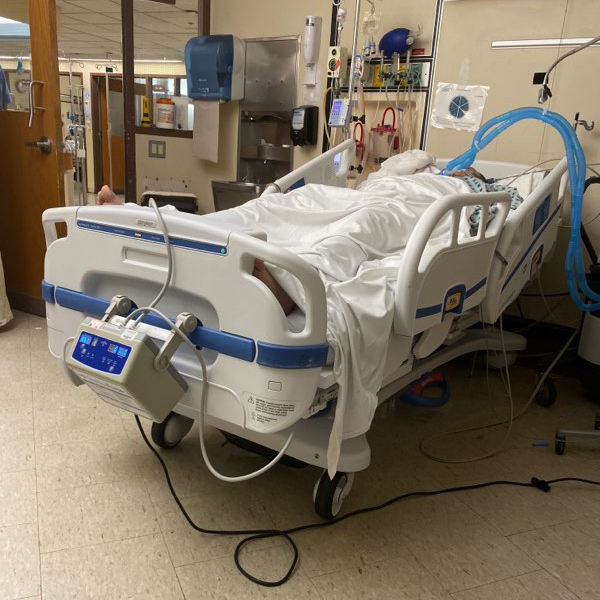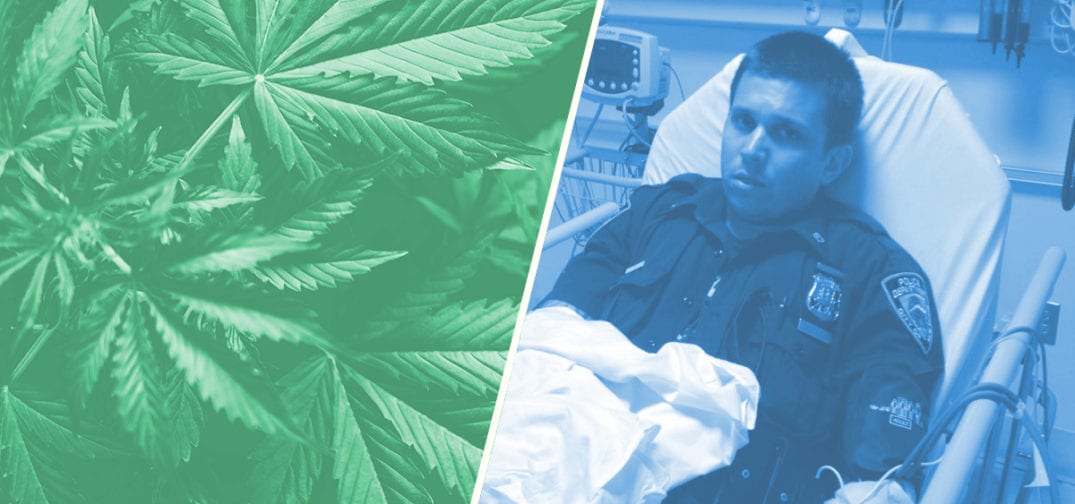Former New York Police Department officer Robert Cascalenda — who retired from the department on September 17 — filed a first-of-its-kind lawsuit against the City of New York on Wednesday, alleging that his former employer discriminated against and harassed him because of his use of doctor-prescribed medical cannabis.
The lawsuit alleges multiple counts of disability discrimination, hostile work environment, and retaliation in violation of both New York state and New York City laws. The suit also contains allegations of negligent hiring practices; negligent failure to train, supervise, and discipline employees; and, lastly, discrimination in violation of New York Health Law §3369, the statewide medical cannabis statute which includes employee protections for registered patients.
The former police officer is pursuing compensatory, emotional distress, and punitive damages from the city as a result of his nightmarish experience.
A downward spiral of opioids and prescription meds
According to the suit, Cascalenda suffered a series of work-related injuries after starting on the force in 2008, including a sprained shoulder in 2010 while working with the School Safety Task Force, followed later that year by fractures in both of his shin bones — the result of wrestling a student who had assaulted a teacher.
Around early 2012, the plaintiff began taking medication for anxiety. Later that year, he was involved in a Line-of-Duty vehicle accident that injured his neck and back. In 2014, he was diagnosed with anxiety disorder and chronic insomnia.
Through it all, Cascalenda was prescribed a hefty regimen of medications including opioids for his pain (including Percocet, OxyContin, Hydrocodone, Tramadol, and Morphine) as well as anxiety and sleeping medications. The plaintiff, however, also suffers from a birth defect that makes him prone to pancreatitis, and the many prescription drugs he was taking exacerbated the issue and he began experiencing regular bouts of pancreatitis.
In 2017, Cascalenda was diagnosed with depression. In 2018, he was placed on restricted duty and his gun and shield were removed. He was also treated for Lyme Disease in 2018 but was not diagnosed — he was, however, diagnosed with chronic pain.
In 2019, he was hospitalized for several days in a coma. During this time, he was given a spinal tap and officially diagnosed with Lyme Disease; he was also diagnosed with fibromyalgia. After the hospitalization, Cascalenda spoke to his private doctor, who warned that he had reached dangerous levels of prescription medication and that he needed to immediately begin weaning himself off the opioids, in particular. His doctor discussed the option of and ultimately recommended medical cannabis as an alternative. Cascalenda, despite suffering from multiple conditions that would qualify him for the New York medical cannabis program, continued with his prescription medications.
In 2019, he began to suffer more severely from anxiety and insomnia. He was later referred for psychiatric evaluation within the NYPD.
Eventually, the plaintiff met with Dr. Joseph Hederman, a doctor with the NYPD Medical Division, who said that he had reached deadly levels of medication and needed to immediately begin decreasing his opioid intake. Cascalenda said he knew this, and that his private doctor had recommended medical cannabis. According to the suit, Dr. Hederman reiterated that Cascalenda needed to reduce his intake of prescription drugs if he wanted to live, and he approved the medical cannabis recommendation given to him by his private doctor.
Cascalenda followed through and began to use medical cannabis, but that was where his coworkers and supervisors took issue.
Internal Affairs Bureau involvement
Following the appointment with NYPD Medical Division, the plaintiff was suddenly being surveilled by the NYPD’s Internal Affairs Bureau (IAB), according to the suit.
The plaintiff was given a “random” drug test on September 5, 2019. On September 11, 2019, he was hospitalized for pancreatitis due to stress and pills. When he was released from the hospital on September 15, IAB told him he was being suspended for 30 days without pay because he had tested positive for cannabis. He tried showing the IAB Seargent his medical cannabis ID card and explained that Dr. Hederman with the NYPD Medical Division had approved his cannabis use.
IAB then took Cascalenda into custody and held him unlawfully overnight in their office. The plaintiff says he was belittled and harassed by members of IAB who accused him of being a hypochondriac and of faking his many illnesses. At one point, an IAB officer allegedly opened the door on Cascalenda while he was using the restroom; the remaining officers (about five, according to the suit) pointed and laughed at him while he was on the toilet. The harassment occurred in front of an IAB Seargent, who “took no steps to intervene,” the suit alleges.
One IAB agent told Cascalenda’s sister — who is also a police officer with the NYPD — that the “job would never approve of an officer using marijuana,” according to the suit.
Following the incident, Cascalenda’s NYPD identification was taken from him but he was allowed to continue using cannabis, as per mandatory appointments with the NYPD Medical Division. At this point, he was still taking pharmaceuticals in addition to his medical cannabis prescription. Stress from the IAB’s harassment was mounting, however, and after failing another “random” drug test in October 2019, IAB told him to stop his medical cannabis use altogether.
At this point, Cascalenda began suffering regular panic attacks. On October 30, 2019, in the midst of a panic attack, Cascalenda suffered a severe asthma attack. He called 911 and communicated that he was suicidal and needed assistance. He was taken to a hospital and placed on a ventilator. He remained in a coma there for seven days, the first three of which he spent handcuffed to his hospital bed. He was also intubated during his hospital stay, which caused vomiting, which caused aspiration in his lungs, which ultimately led to pneumonia.

Cascalenda left the hospital on November 21, 2019. Prior to his discharge, he was also diagnosed as bi-polar.
The following months contained a series of professional retaliation in the form of unwarranted surveillance and purposefully cruel assignments. According to the suit, Cascalenda was told he could continue to do his work if he stopped using medical cannabis and switched back to his prescription medications.
In February 2020, Cascalenda put in his retirement papers for psychological disability pension. His last day at the NYPD was September 17, 2020.
The law is clear
New York lawmakers legalized medical cannabis in 2014 with what was — and still is — considered one of the country’s most restrictive medical cannabis laws. According to Cascalenda’s attorney John Scola, however, New York law clearly states that medical cannabis patients are considered disabled under the state’s employment protections for people with disabilities, and there are strict employment protection rules in place to benefit such people.
As for federal law, which still considers cannabis illegal as a Schedule 1 substance, “The [Controlled Substances Act] makes marijuana illegal, but it doesn’t make hiring marijuana users illegal,” Scola told Ganjapreneur.
For his part, Cascalenda — who is still using medical cannabis as per his prescription — says he feels betrayed by the department.
“I thought the job would be there after I almost died,” he told Ganjapreneur.
“I only filled the prescription for medical marijuana after it was expressly approved by the Medical Division. When I needed the NYPD most, they suspended and stripped me of my health insurance simply because I was prescribed a non-fatal alternative to opioids.” — Robert Cascalenda, former NYPD officer, in a statement
The lawsuit demands a trial by jury.
A representative for the NYPD told Ganjapreneur that the department will review the lawsuit when they are served.
Get daily cannabis business news updates. Subscribe
End
